Short answer- yes, it can. Infant diarrhea may be caused by using a different formula. Your little one may just need to adjust to the new composition.
Diarrhea After Switching Formula: A Parent’s Guide
By: Suzanne Renee' - Updated April 11, 2024 - 11 Minute Read
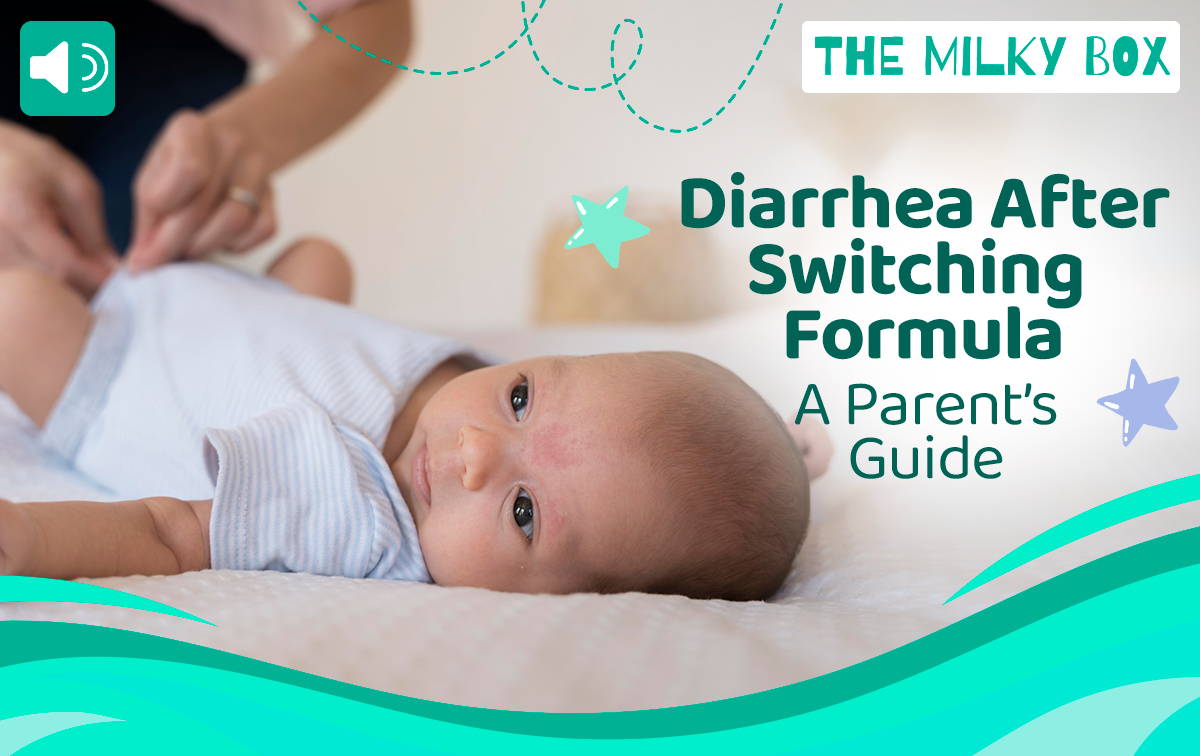
You can find a lot of different textures, colors, and odors in a baby’s diaper. A baby’s poop is usually softer than older children and adults, and it is not uncommon for caregivers to find a loose stool.
Infant diarrhea can be brought on by numerous factors, from diet to infections. What about when you switch from one baby formula to another? Will the change upset your baby’s system?
In this article, we will be answering your questions about infant diarrhea and what you can do to help your little one.
Table of Contents:
1. Diarrhea After Switching Baby Formula
2. Top Reasons to Change Baby Formulas
3. Diarrhea In Formula-Fed Babies Can Also Be Caused by Viruses
4. Formula Allergy Is the Most Common Cause of Diarrhea in Formula-Fed Babies
5. Signs and Symptoms of an Allergy, like a Cow's Milk Allergy
6. Is Diarrhea Caused by Switching Formulas?
7. What to Know About Switching Baby Formula
8. Diarrhea After Switching from Breastmilk to Formula
9. How Long Does It Take a Baby to Adjust to a New Formula?
10. How Long Should a Baby Have Diarrhea After Switching Formula?
11. How Long After Changing Baby Formula Do You See Side Effects?
12. Consider Infant Probiotics for Diet Issues
13. Newborn Diarrhea
14. Frequently Asked Questions
Diarrhea After Switching Baby Formula
Formula changes happen for many reasons. There are allergies, digestive issues, and, most recently, infant formula shortages.
Babies can often switch formulas without worry. Diarrhea may occur in unusual instances, this could mean that your baby’s immature digestive system may just need time to adjust.
Top Reasons to Change Baby Formulas
Most families will start their little ones on standard cow milk baby’s formula. If your little one is not tolerating the current formula and there are signs and symptoms of intolerance, it may be time to look at other varieties or specialty types.
Excessive Spit Up
Normal spitting up will not interfere with infant health and overall well-being. As long as your baby seems comfortable, is gaining weight, and has the required wet diapers, there's little cause for concern.
But if it is happening all the time or after a change to a different formula, it may be a sign that the infant is struggling to digest and you may want to pay attention carefully, consider switching formulas to something typically easier to digest such as goat, or even supporting their digestion with probiotics and/or enzymes.
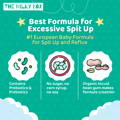
Slow Weight Gain
A tried-and-true method of gauging if your little one is doing well on their current formula is to track weight gain. Slow weight gain is a problem when it interferes with a child’s healthy development, particularly during your baby’s first year when their cognitive reasoning is evolving.
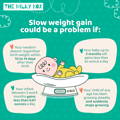
Fussiness Following Feedings
If your baby is crying a lot after every feeding, it may simply be a buildup of air swallowed while eating or it may be an intolerance to your current baby formula.
Excessive crying and fussiness are often soothed when switching from a standard milk-based formula.
Bloody Stool
When you find blood in your baby poop it can be scary. The good news is that, for the most part, small amounts will indicate a temporary issue, such as constipation. However, it can also signal a more significant issue, such as a cow’s milk allergy or a life-threatening medical condition.
It is crucial to get professional medical advice to ensure all is well with your baby’s digestive and overall health if this continues beyond an occasional slight trace or is getting worse over time.
Severe Constipation
It is common for infants to become constipated when they begin baby formula; in fact, up to 30% of newborns have this trouble. If your baby is straining, producing hard, small stools, or suffering digestively, a diet change could provide some much-needed relief.
Also ensure they’re getting enough hydration on a given day so this isn’t factoring in.
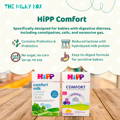
Diarrhea In Formula-Fed Babies Can Also Be Caused by Viruses
Rotavirus is a contagious virus that causes diarrhea. Although rotavirus infections are unpleasant, you can usually treat this infection at home with extra fluids to prevent dehydration.
Formula Allergy Is the Most Common Cause of Diarrhea in Formula-Fed Babies
Babies who develop a milk allergy within their first few months can show symptoms immediately following feeding or up to 10 days later.
If your baby develops any of these symptoms after introducing a new formula, contacting your family medical caregiver directly before making another bottle is best.
Signs and Symptoms of an Allergy, like a Cow's Milk Allergy
Cows' milk allergies (CMA) are among the most common childhood food allergies. It is estimated to affect around 7% of babies under one. This worrisome health concern typically manifests when cows' milk is first introduced through your little one’s infant formula.
There are two main types of Cow’s Milk Allergies (CMA): immediate CMA – where symptoms typically begin within minutes of having cows' milk, and delayed, where symptoms typically begin several hours or even days after having cows' milk.
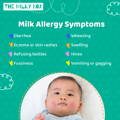
Is Diarrhea Caused by Switching Formulas?
Though not common, changing formulas may cause diarrhea in babies. Just as each infant is unique, so are the digestive needs.
One infant may do well with a popular brand or ingredient, while others might take a little while for gut flora to settle. This can lead to tummy cramps, gas, and, yes, even diarrhea.
Diarrhea is often just the body's reaction to changes and adjusting to the new composition.
What to Know About Switching Baby Formula
If you are switching formulas for medical reasons - to a hypoallergenic formula due to an allergy, for instance, your qualified provider should be advised will advise you to discontinue the offending baby formula and switch with the next bottle.
However, if you are changing for other reasons, such as formula shortages or a small number of digestive worries, you can take a slower approach to help make the transition a little easier.
Gradual Transition
Finding the perfect taste and texture is not always easy. If your infant does not seem to like the new choice of formula right away, we suggest starting slowly.
First, a combination of three parts old baby formula to one-part new baby formula; when your baby accepts that, move to half-and-half. Then, gradually increase the ratio of the new formula until you no longer add the old brand.
Consult Your Baby’s Pediatrician
Families consider switching formulas mainly due to digestive worries or allergic reactions. It is easy to confuse normal infant behavior for allergies or intolerances. To ensure your baby finds the perfect baby formula, we suggest consulting your child’s qualified practitioner before making any dietary changes. Hence, you make sure you move to the right baby formula.
Consider Each Formula’s Protein Type
When switching, there are four main procedures to consider. Talking with your pediatrician will help you find the right fit for your baby.
Milk-Based
This standard formula contains intact cow or goat milk proteins, casein, and whey. Cow milk proteins are larger than human milk proteins (breast milk) and can be difficult for some babies to digest. Goat milk has small proteins that can be easier for babies to absorb, but as with all lactose-based formulas, not all babies can tolerate them especially if there is a milk protein allergy.
Partially or Fully Hydrolyzed
Milk proteins in partially or fully hydrolyzed formula are broken into smaller pieces. Some types include 100% whey protein, while others are a casein-whey blend with added whey.
Hydrolyzed formulas are often recommended for babies with a family history of eczema and babies with reflux symptoms.
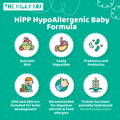
Extensively Hydrolyzed
Often referred to as hypoallergenic formula, extensively hydrolyzed formula has milk proteins that are almost entirely broken down. It may be recommended for infants allergic to cow’s milk. These infant formulas may also be beneficial if your baby has lactose intolerance.
Lactose-Free
Vegan formulas are recommended for babies who can’t tolerate dairy or have other health-related worries. Plant-based baby formulas are nutritionally balanced and lactose-free choices for infants.
It is strongly recommended when choosing a vegan formula that soy formula is avoided. Among their main drawbacks with soy formula is the higher aluminum content, which may cause weaker bones in pre-term babies, and elevated levels of phytoestrogen could adversely affect full-term babies.
Diarrhea After Switching from Breastmilk to Formula
As long as the baby gets only breast milk, baby poop may be soft and smell sweeter. As you introduce baby formula, you will notice that parents may notice the baby stool has a more pungent odor and the appearance changes in color and consistency. In some cases, diarrhea is the result of the change.
Diarrhea is a common side effect as the stomach adjusts to the new ingredients and is generally nothing to be too alarmed about. It may take some time for a baby's digestive system to transition from breast milk or formula.
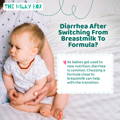
How Long Does It Take a Baby to Adjust to a New Formula?
It usually takes about 14 days for babies to switch baby formula.
Your baby might like the taste and texture immediately, but there is also a chance that you might not like any of them right away. Hypoallergenic formulas, such as HiPP HA Pre for example, cause fewer or no allergic reactions, but they can be quite different from whole milk baby formula.
Transitioning from Breastmilk to Formula
Transitioning from breastfeeding to formula is not an easy task. Begin by substituting a bottle feeding for one breastfeeding session—ideally, the one your baby will miss the least. Allow yourself two to three weeks of consistent formula offering to make the complete change.
When selecting the best baby formula, it's important to choose one that has the ideal blend of nutrients and is easily digestible for your little one.
Additionally, it should contain pure and clean ingredients, which will help avoid allergenic and inflammatory ingredients that can upset your baby's digestion. By choosing a formula with gentle ingredients, your baby's gut flora will be able to settle, reducing the likelihood of digestive issues.
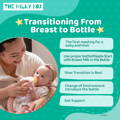
How Long Should a Baby Have Diarrhea After Switching Formula?
Diarrhea from switching baby formula usually clears up within a few days. If diarrhea lasts over a week and is accompanied by fever or blood in your baby’s stool, speak to your pediatrician immediately.
How Long After Changing Baby Formula Do You See Side Effects?
The most common side effects of switching formulas are fussiness after feeding and changing stool patterns. These side effects do not necessarily signal trouble if your baby's poop changes.
Formula Rejection
You may notice that the new formula is not settling well immediately, or it may take a few days before your little one begins to reject the new formula. Observe any behavioral or tummy changes as you switch from one formula to another.
Some changes to watch are sleeping patterns, bowel movements, or fussiness. If you notice any negative changes, the formula may upset your baby.
If the baby rejects the formula, it is best to try a bit longer before talking to your pediatrician about changing it again.
Consider Infant Probiotics for Diet Issues
Probiotics are live bacteria considered “healthy.” They help an infant’s microbiome in breast-fed babies and formula-fed infants. All infants can benefit from baby probiotics to support good gut health. This is double true when switching baby formulas.
Probiotics added to baby formula are beneficial in treating conditions that start in an upset digestive system, like baby diarrhea. They may also help manage allergies and to prevent urinary tract infections.
Newborn Diarrhea
Reasons to consider switching your little ones’ nutrition are as unique as your infant’s. By choosing European Baby Formula, your baby has a great chance of digestive success.
At The Milky Box, our European formula experts are here to help find the breastmilk alternative or complement to soothe worries and support healthy growth and development.
Frequently Asked Questions
Can changing baby formulas cause diarrhea?
Is it normal for a baby to get diarrhea when switching formula?
Making a formula switch can cause diarrhea in infants. It might take a few days to a few weeks for your little one to get used to a new formula.
Will switching formula hurt my baby?
Most babies will adjust to the new taste quickly and easily. Changing a formula is not always easy, but when it is necessary, making the formula change will not be harmful to your baby's health.
Disclaimer:
Please be aware that this information is based on general trends in babies, and it is not medical advice. Your doctor should be your first source of information and advice when considering any changes to your child’s formula and when choosing your child’s formula. Always consult your pediatrician before making any decisions about your child’s diet or if you notice any changes in your child.
Breastfeeding is the best nutrition for your baby because breast milk provides your child with all the essential nutrients they need for growth and development. Please consult your pediatrician if your child requires supplemental feeding.

Suzanne Renee' is an accomplished professional with extensive expertise in the area of infant nutrition, dedicated to promoting the health and wellbeing of children. She started this journey as a foster parent. Suzanne has emerged as a strong proponent of the European baby formula and has become a full time writer of the subject. In her free time, she enjoys camping, hiking and going to church.
Read Next:
Reviewed by Dr. Eric Wood, ND, MA

Dr. Wood is a licensed naturopathic doctor, with a doctorate degree from the Canadian College of Naturopathic Medicine in Toronto, Canada. He received his post-graduation certification in Mind Body Medicine at Harvard University.
With 15 years of experience, Dr. Wood is an Associate Professor of Holistic Nutrition at the American College of Health Sciences in Portland, Oregon. Dr. Wood is an educator, clinician, author, media figure, consultant, and owns his own holistic (naturopathic) medical practice in Ft. Lauderdale, Florida. Dr. Wood is currently researching and drafting books on cancer and pediatrics.
Outside of the medical profession, Dr. Wood loves singing with the Miami Lyric Opera and is an avid musician in South Florida. He also loves spending time with his wife and kids.

